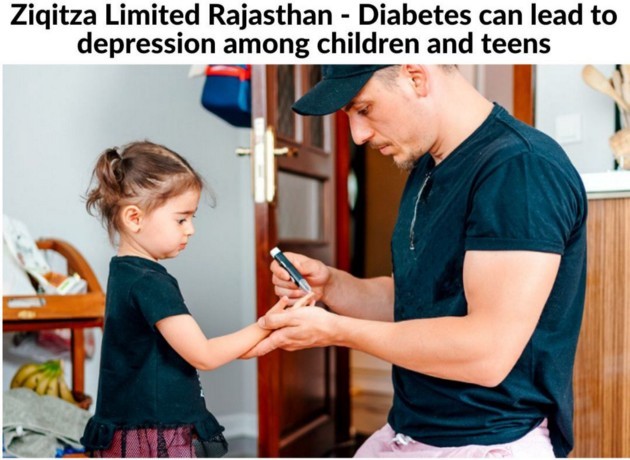Diabetes is a medical condition that can affect people of all ages. There are numerous types of diabetes, but the two most well-known types are, Type 1 and Type 2 diabetes. Type 1 diabetes is more common in children and adolescents, whereas Type 2 diabetes is more common in adults and can affect children as well.
Type 1 diabetes, also known as juvenile diabetes, is a form of diabetes that affects children and young adults. However, current patterns also indicate that more young adults and adolescents are receiving Type 2 diabetes diagnoses. Ziqitza Healthcare ltd, one of India’s leading healthcare service providers says that diabetes is more than just a physical ailment. Diabetes and mental health are inextricably linked.
Increased scientific evidence, according to Ziqitza Healthcare, shows that adolescents with Type 1 diabetes have a five-fold higher rate of depression than adolescents without Type 1 diabetes, and that children with diabetes are more likely to experience depression, anxiety, and suicidal thoughts.
When a child is diagnosed with diabetes, several changes in their way of life and health occur. Ziqitza healthcare elaborates that diabetes patients not only go through physical changes, but also some emotional and mental health problems. Anxiety, stress, and mood swings are behavioural issues that diabetes-related stress presents in kids, teens, and parents.
How do Children with Diabetes Go Through?
They Feel Isolated: Children who have diabetes frequently feel different from their peers. They may need to see teachers or medical staff at school for insulin injections, medications, or blood sugar checks, which may make them feel out of the ordinary or lonely.
They Deal with Denial: Ziqitza Rajasthan says that denial becomes a constant part of children with diabetes. The majority of kids and teens go to playgrounds, shopping centres, fast food restaurants, summer camps, and sleepovers, but kids with diabetes frequently aren’t allowed because their parents are constantly concerned about their wellbeing.
They Suffer from Depression: Diabetes and depression are associated with one another. According to some studies, children with diabetes have a higher risk of developing depression. Between 15 and 20% of adolescents with diabetes are depressed because of their diabetes. According to a recent study cited by Ziqitza Limited and published in the American Diabetes Association journal Diabetes Care, teenagers with T1D are more likely to experience depression than their non-diabetic peers. Researchers have found that depression can also compromise blood glucose monitoring, affect glycemic control, and lead to more frequent hospitalizations. For these reasons, both national and international standards recommend that all diabetic teenagers undergo routine depression screening.
Children with diabetes frequently experience sadness, irritability, lack of focus, lethargy, sleep disturbances, appetite changes, low motivation, decreased participation in activities, and suicidal thoughts, according to ZHL Rajasthan.
They are Stressed & Anxious: According to Ziqitza Limited Rajasthan, managing diabetes, checking blood sugar levels, and upholding a number of restrictions to keep diabetes under control can be stressful for kids and teenagers at a time when they are typically carefree and playful.
It can become too much to handle the required hospital and clinic visits for diabetic care, monitoring the risks and complications involved, and lowering the risk of or avoiding other infections by keeping a strong immune system. Diabetes and stress therefore coexist in children.
They Develop Eating Disorder: According to Ziqitza Health care Limited, it is a disorder marked by abnormal eating habits like binge eating or calorie restriction. Dietary restrictions frequently cause diabetics to become overly self-conscious about their bodies, weight, and food intake. The practice of reducing food intake while increasing daily exercise to maintain body weight frequently results in the body being punished. You might notice symptoms like losing weight, throwing up, more frequent urination after meals, restrictive eating, bingeing, skipping meals, etc.
Diabetes can be a mentally taxing medical condition. Therefore, using the best coping mechanisms can assist in preserving the mental health of children who have diabetes.
Diabetes is associated with many physical and psychological challenges, so young people with diabetes need special care to manage the mental stress of diabetes. While some people seem to handle it well, others struggle. As a result, parents of diabetic children and caregivers need to be aware of the associated mental health problems.


